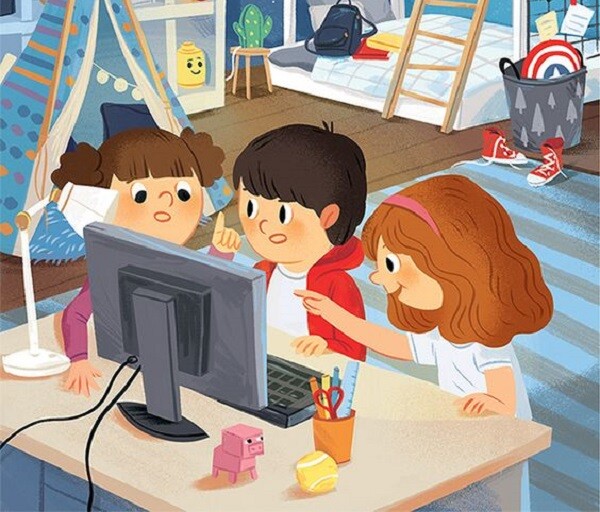Many graduates from prestigious universities face unemployment or are forced to switch careers to make a living. This reality makes us realize that we should not rely solely on academic qualifications.
On this matter, an expert points out that what makes students stand out is not just their academic achievements, but also the cultivation of certain skills to better fit and adapt to a changing society. And this training needs to start early.
So, for parents who wish for their children to have a bright future, it’s important to focus on more than just grades. The expert identifies five key abilities that will be the “ace up their sleeve” and determine their child’s future life.

Self-care Ability
A child who cannot take care of themselves will struggle to build a comfortable and independent future. Teaching children basic self-care skills helps them develop the ability to face life’s challenges.
The story of a Japanese mother who, despite her serious illness, spent her final days teaching her four-year-old daughter, Ahua, how to cook and do housework, is a perfect example. Even though she knew her time was limited, she persevered in imparting these valuable lessons, hoping that these skills would enable Ahua not just to survive but also to face life’s storms with resilience. She wanted Ahua to learn to smile at the world and live with courage, no matter the circumstances.

Self-care ability.
After her mother’s passing, despite being only four years old, Ahua faced a significant challenge. She couldn’t reach the sink, but her perseverance and love helped her overcome this hurdle. Every day, Ahua would stand on a small stool to cook simple meals like miso soup and brown rice, not just to take care of herself but also to save her grieving father from despair. This was not just the action of a child but the manifestation of a strong, loving, and responsible soul.
Children with self-care abilities often bring their own warmth. They know how to care for themselves and others, fostering positive and lasting relationships. Self-care ability enables children to live their own lives amid adversity, building self-confidence and the patience needed to face upcoming challenges.
When equipped with the necessary skills, children will grow up to be independent, capable of making their own decisions, and taking responsibility for their lives. Therefore, teaching children self-care is a crucial aspect of their education—a precious gift parents can impart to foster their child’s resilience during adulthood.

Emotional Management
Xiao Li, a fresh graduate from a prestigious university, quickly landed a job at a foreign company. However, just six months later, he encountered significant troubles. During his tenure, he had disagreements with colleagues due to differing work views. The tension escalated during a meeting when his boss criticized some of his mistakes. Instead of controlling his emotions and responding maturely, Xiao Li lashed out, resulting in his dismissal.
During his academic years, Xiao Li’s sole focus was on achieving high grades and academic recognition. But upon entering the workforce, he realized that success stems not just from expertise but also heavily from emotional intelligence. Later on, he understood that if he couldn’t control his emotions, he would only be hurting himself and hindering his progress.

Emotional management.
The renowned writer Lin Yutang once said: “A person with stable emotions gives people a sense of security. Because they don’t hurt others or themselves. They don’t cause trouble or bother others.” This emphasizes that stable emotions are a desirable personal trait and a crucial factor in building positive relationships.
From Xiao Li’s experience, we see that a child with high EQ can better integrate into society, knowing how to behave in stressful situations and face difficulties with a smile. These children can usually understand their emotions, feel and empathize, thereby fostering positive and lasting relationships.
Developing emotional intelligence from an early age is vital. Children need to be taught to recognize their emotions and manage and express them appropriately.

Self-Learning Ability
The world is changing rapidly, and if children solely rely on what they learn in school, they will struggle to stand out in the fierce competition of modern society. The knowledge they acquire in the classroom can quickly become outdated, especially with the rapid advancement of technology and information.
The ability to continuously self-learn is a determining factor in a child’s ability to adapt and progress. This means that learning and self-improvement are lifelong journeys, not limited to the years spent in formal education.
Fostering a self-learning spirit from a young age will help children develop a curiosity for exploration and a habit of seeking information.
An individual with a strong self-learning ability takes the initiative throughout their life, constantly seeking development opportunities. Children with this ability can easily find their place in a changing future, where new skills and updated knowledge are essential.
They quickly adapt to new situations, maintain an optimistic mindset, and embrace challenges.

Self-learning ability.

Goal Setting and Action
An individual who constantly overthinks and analyzes everything but lacks the motivation to act will likely lead an unfulfilling life. Overthinking can lead to indecisiveness, causing valuable opportunities to pass by. Therefore, it’s crucial to couple thinking with the initiative to turn ideas into practical actions.
No matter how high their academic qualifications are, if children are not diligent and determined to execute their plans, they will struggle to achieve their goals. Knowledge is just one part of the equation; effort and perseverance are the keys to success.

Goal setting and action.
Children who dare to take action and strive for improvement will undoubtedly reap the rewards of their efforts one day. Stepping out of their comfort zone and embracing risks will foster their personal growth. Whether they succeed or fail, their practical experiences will contribute to a valuable reservoir of knowledge for the future.
When children see that they can turn their ideas into reality, they will be further motivated to pursue more significant dreams. Therefore, encouraging children to develop a habit of action and perseverance lays a solid foundation for their future success.

Logical Thinking Ability
Logical, multidimensional, and flexible thinking is the “ultimate weapon” for children to navigate the future world. In an era of rapid change, only those with flexible thinking can embrace and overcome challenges.
In reality, no one can predict the future, and the world our children will inhabit will undoubtedly be different from today’s. Technology, culture, and communication will continue to evolve, and children need to learn to challenge themselves to discover new things. Preparing for the future involves not just imparting knowledge but also building a robust mindset.

Logical thinking ability.
Children with strong logical thinking skills can ask questions, think independently, and use their analytical and judgment skills to find solutions and achieve breakthroughs. These children proactively seek the truth, identify connections, and develop their own ideas.
To cultivate logical thinking in your child, engage in discussions on various topics, from simple to complex. Encourage your child to explore different fields, including science, arts, and sociology, to develop a holistic and multidimensional perspective of the world.


































